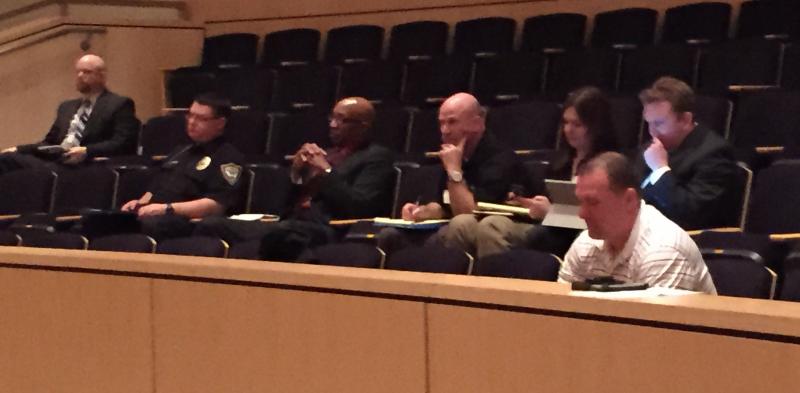The session, “Body Cameras and their Importance in Building Community Trust,” was taking place about 40 miles south of where a Cleveland police officer is being tried for his role in a massive chase and shooting of two unarmed people two years ago.
It’s a trial dominated by questions of who did what and why – and of police-community relations.
Could body cams have provided answers?
Civilian review advocates like Ainsley Cromwell of the National Association for Civilian Oversight of Law Enforcement say those are the kinds of questions cameras worn by cops can help answer.
“We want to know how things occur when excessive use of force occur. We want to hear the language that’s used in policing. We want to know more about policing.”
But he acknowledges they’re no panacea.
“Sometimes there’s no audio in the video. Sometimes just because you see something, there are many different interpretations of what actually occurred. You can’t have the cameras on 24/7. The officers do have a bit of privacy. There’s cost involved.”
Cincinnati's big changes
And several of the roughly 60 people attending the conference at the Akron-Summit County Public Library said the cameras need to be part of a bigger attempt to help police and the wider community understand each other.
 Pam King is acting director of the Citizen Complaint Authority in Cincinnati. Back in 2001, police there shot and killed an unarmed man named Timothy Thomas. It triggered massive riots. Pam King is acting director of the Citizen Complaint Authority in Cincinnati. Back in 2001, police there shot and killed an unarmed man named Timothy Thomas. It triggered massive riots.
Our relationship with the Cincinnati police at that point as civilian oversight investigators – it was a struggle to say the least.” But King says the struggle gave way to introspection and to real reform.
She says her office is now part of the training for each new class of officers, has access to police databases and other material, gets a quick response when it asks the department for more information, and “when we get to the scene in 2015, the police department is actually looking for us.”
In fact, King says her only complaint is staffing. She and her one investigator are expected to follow up on every complaint of excessive force, improper searches and seizure and improper use of a firearm – and complete a report within 90 days.
Big tests ahead
Cincinnati does not yet have the body cams – but it’s testing them.
So, too, is Akron. It’s outfitting 30 officers with the cameras for at least 270 days. Assistant Akron Police Chief Kenneth Ball says a key part of the test is Kent State’s monitoring their use -- the first such research in the Midwest to determine “if it has an impact on use of force situtation, complaints against police officers and then other metrics, domestic violence case convictions because of the video, is it going to help our conviction rate?”
Meanwhile, Ball says the city’s still trying to come up with money to fund the cameras department wide.
'Bad boys, bad boys'
The civilian who’s been charged with years with handling complaints against the Akron Police Department, Phillip Young, says the cameras have so far been well-received by the officers. “I think the ones that do a good job, they have no problem with having cameras and other ways to protect them against maybe a complaint or a situation. The majority, they probably look forward to having another tool that will help them in their everyday duties.”
 Detroit’s civilian police commissioner isn’t so sure. Reginald Crawford’s city also is testing the cameras. But Detroit had suspended an earlier trial and Crawford insists that was not because of the city’s chronic shortage of cash. The cameras – he says – often get lip service couched with reservations about privacy. Detroit’s civilian police commissioner isn’t so sure. Reginald Crawford’s city also is testing the cameras. But Detroit had suspended an earlier trial and Crawford insists that was not because of the city’s chronic shortage of cash. The cameras – he says – often get lip service couched with reservations about privacy.
"It’s really kind of hypocrisy because for years there was a show called ‘Cops,’ where cameras went into the house across America with police officers. There wasn’t a problem. But now there seems to be a concern about officers caught on camera.”
But even if his city – and others – are moving ahead with cameras, Crawford says they can’t stop there.
“There needs to be an independent investigation, there needs to be prosecution and ultimately of those who are responsible for a particular incident, there needs to be a conviction and prison time.”
And others of those attending the conference say there also must be a real understanding that cops and communities need each other.
|
 Among those attending the conference was Joe Pioli, a retired Seattle police officer who now sells the cameras for a company called VIEVU. He acknowledges some officers are concerned they’ll get nailed for technicalities. Among those attending the conference was Joe Pioli, a retired Seattle police officer who now sells the cameras for a company called VIEVU. He acknowledges some officers are concerned they’ll get nailed for technicalities.
“Let’s say for example the allegation is that I’m rude, but then I get in trouble because I didn’t put my seat belt on. So it comes back to educating the officers about what the cameras are about. The transparency to build a solid relationship between the law enforcement and the community and for them to be able to be confident in their departments and the policies that they work under – that they’re fair and equal.”
|
|